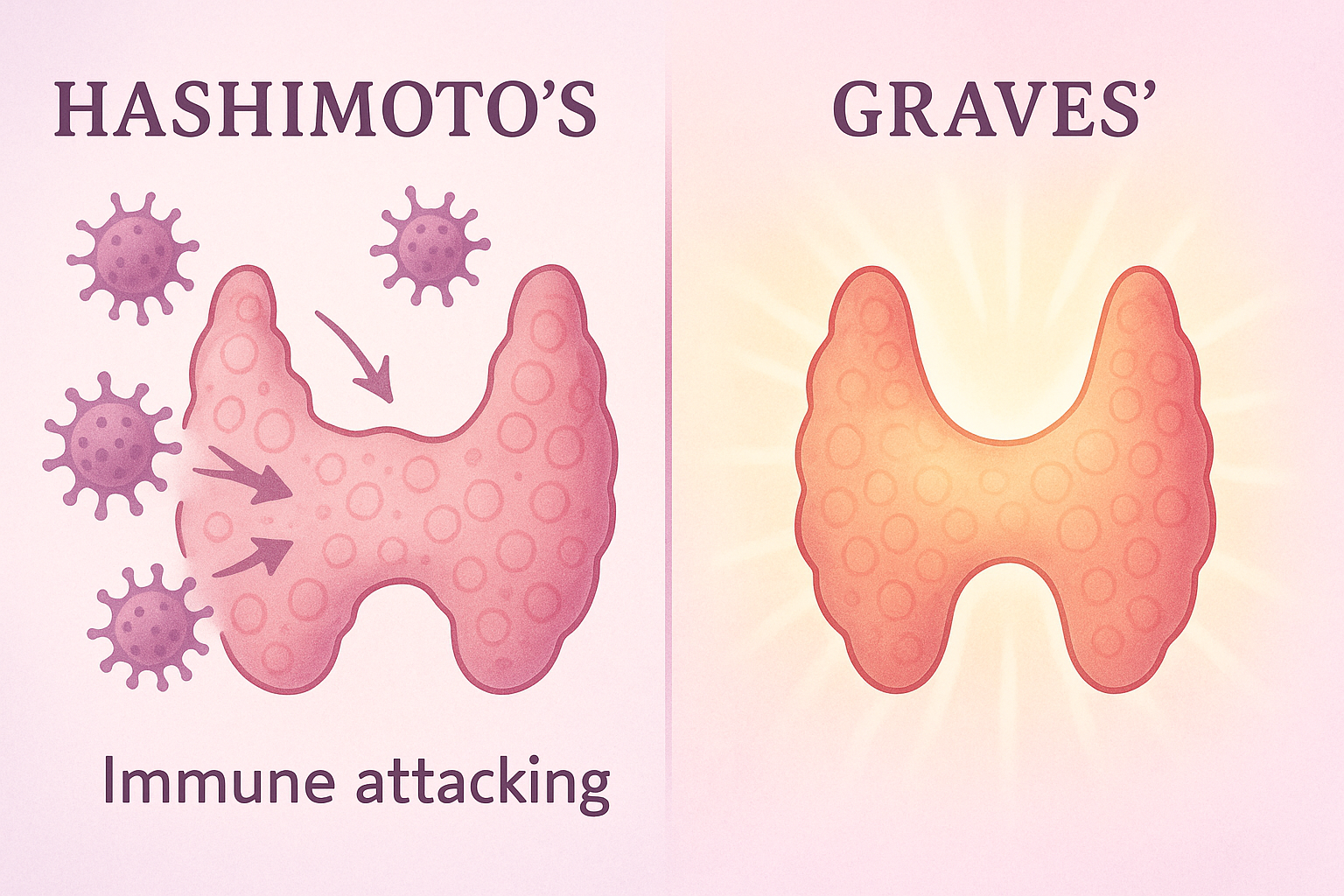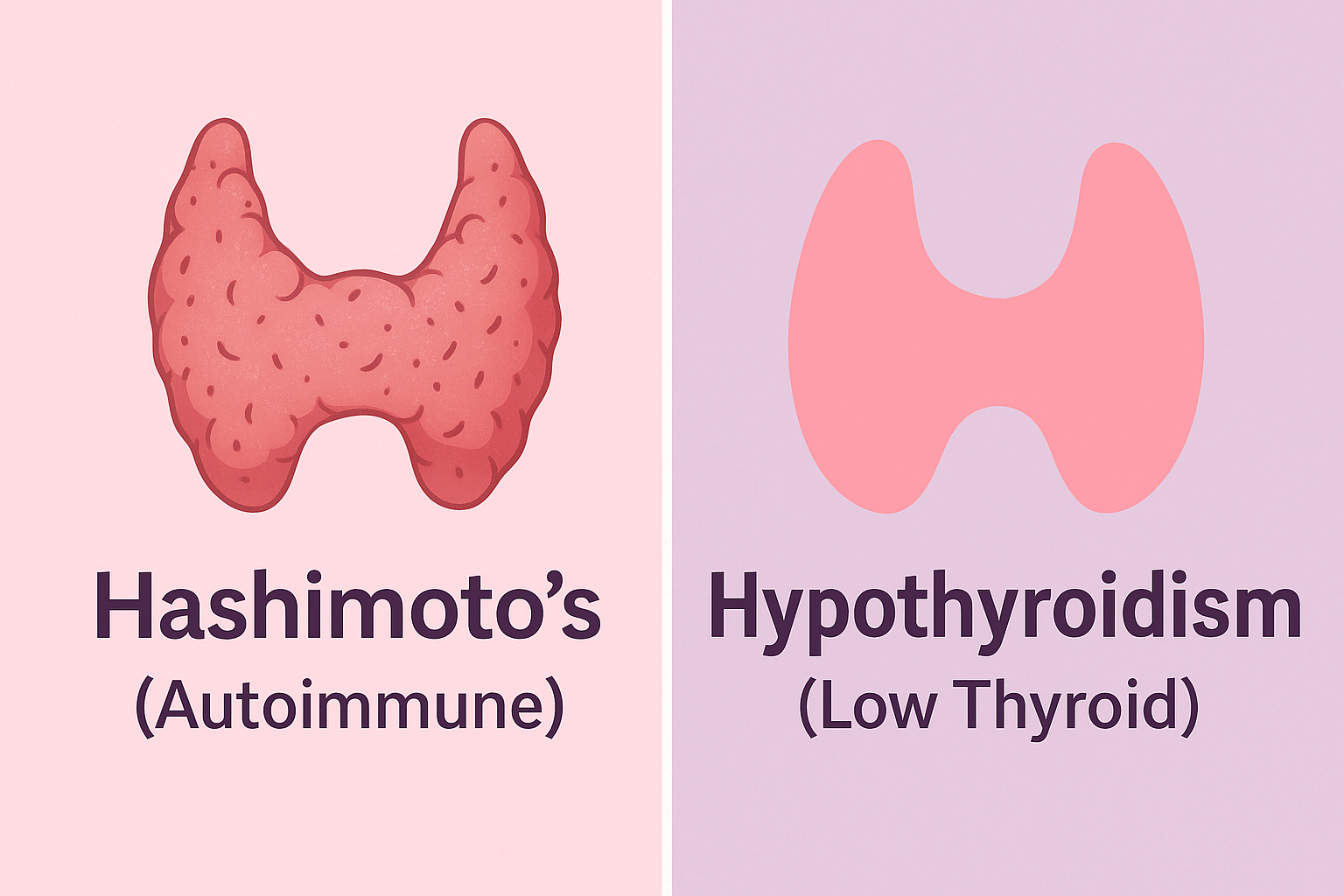Ever feel exhausted no matter how much you sleep — yet still anxious or restless inside?
You’re not imagining it.
Your thyroid and stress hormones are in constant conversation, and when one goes out of balance, the other quickly follows.
For many women, chronic stress quietly slows thyroid function, leading to fatigue, brain fog, weight changes, and mood swings that seem impossible to fix with diet alone.
The good news? You can calm the storm naturally — once you understand how stress impacts your thyroid and how to bring harmony back to your hormones.
💡 If you’re new to thyroid health, start with The Complete Guide to Thyroid Health for Women
⚙️ The Connection Between Stress and Thyroid Function
When you’re under pressure — whether from work, family, or hidden emotional strain — your body releases cortisol, the main stress hormone.
Cortisol’s job is to keep you alert and focused in emergencies. But when stress becomes constant, cortisol levels stay high, and that’s when trouble begins for your thyroid.
Here’s what happens inside your body:
1️⃣ Your brain’s pituitary gland tells your thyroid to slow down, conserving energy for “survival.”
2️⃣ Cortisol interferes with the conversion of thyroid hormones — turning off your metabolic “spark.”
3️⃣ Your adrenal glands (which produce cortisol) become overworked, pulling resources from thyroid hormone production.
This connection is known as the HPA Axis (Hypothalamic–Pituitary–Adrenal Axis), and it’s one of the main pathways linking your stress response to your thyroid function.
📘 If you often feel tired and cold, read Signs of an Underactive Thyroid to learn more about early symptoms.
⚡ How Cortisol Disrupts Thyroid Hormones
Let’s break it down simply — when stress stays high for too long, your thyroid slows down to protect you.
Here’s how:
🔹 1. Blocks Hormone Conversion
Your body converts T4 (inactive thyroid hormone) into T3 (active hormone) — the one that fuels your metabolism.
Cortisol disrupts this process, so even if your thyroid produces enough hormones, they may not work properly.
🔹 2. Reduces Thyroid Sensitivity
High cortisol makes your cells less responsive to thyroid hormones — similar to insulin resistance. You might have normal lab results yet still feel sluggish.
🔹 3. Drains Essential Nutrients
Stress depletes magnesium, selenium, and B vitamins — nutrients your thyroid needs to function efficiently.
🔹 4. Triggers Hormonal Imbalances
Cortisol competes with sex hormones like estrogen and progesterone, leading to mood swings, irregular cycles, and brain fog.
Over time, this hormonal chaos becomes what many women describe as “tired but wired.”
🌿 Nutrients like selenium, magnesium, and B12 — found in Thyrafemme — can help reverse these effects naturally.
😣 Signs Your Thyroid Is Affected by Stress
Your body sends subtle signals long before lab results show a problem. Look for these early warning signs:
- Persistent fatigue, even after full sleep
- Unexplained weight gain or difficulty losing weight
- Feeling anxious, jittery, or emotionally sensitive
- Brain fog or forgetfulness
- Low motivation or depressed mood
- Irregular menstrual cycles
- Cold hands and feet
- Trouble sleeping or waking up unrefreshed
If several of these sound familiar, your stress levels may already be affecting your thyroid function.
💕 Many of these overlap with early hypothyroid symptoms — learn more in Signs of an Underactive Thyroid.
🌿 The Adrenal–Thyroid Connection
Your adrenal glands and thyroid gland are like two dance partners — they rely on rhythm and timing. When one partner (the adrenals) moves too fast, the other (the thyroid) slows down to maintain balance.
This is the adrenal–thyroid connection.
When stress is chronic:
- Adrenals overproduce cortisol.
- The thyroid slows hormone production to conserve energy.
- Metabolism drops.
- You feel tired, anxious, and cold — all at once.
Supporting both glands together is essential. That means nourishing the thyroid and calming the adrenals through lifestyle, nutrition, and adaptogens.
🧘♀️ 6 Natural Ways to Lower Stress and Support Your Thyroid
You can’t remove all stress from life — but you can teach your body to respond to it better.
Here’s how to lower cortisol and support your thyroid naturally:
1️⃣ Practice Mindful Breathing
Deep breathing activates your parasympathetic nervous system — the “rest and restore” mode.
Try this:
Inhale for 4 seconds → hold for 4 → exhale for 6.
Repeat 10 times whenever you feel tense.
Just 2–3 minutes of mindful breathing can lower cortisol significantly.
2️⃣ Eat a Nourishing Thyroid-Friendly Diet
Nutrients are your thyroid’s lifeblood. Include iodine, selenium, zinc, magnesium, and protein-rich foods daily:
- Seaweed, eggs, fish, leafy greens, and Brazil nuts.
- Avoid processed foods, refined sugars, and too much caffeine.
🥗 See our Thyroid-Friendly Diet for Women for full meal ideas.
3️⃣ Get Consistent, Restorative Sleep
Poor sleep spikes cortisol and throws hormones off rhythm.
- Aim for 7–8 hours per night.
- Avoid screens 60 minutes before bed.
- Try a magnesium-rich tea or warm turmeric milk to unwind.
4️⃣ Limit Caffeine and Sugar
Caffeine and sugar give quick energy at a cost — they spike adrenaline, causing cortisol to surge.
Swap coffee for green tea, and choose fruit or dark chocolate instead of sugary snacks.
5️⃣ Move Gently, Not Aggressively
High-intensity workouts can worsen cortisol when your body is already stressed.
Instead, focus on movement that grounds you:
- Yoga or stretching
- Brisk walking
- Pilates
- Dancing or swimming
Exercise should energize you — not exhaust you.
6️⃣ Use Adaptogens for Hormone Harmony
Adaptogens are natural herbs that help your body adapt to stress. They regulate cortisol and support both adrenal and thyroid health.
Best adaptogens for thyroid balance:
- Ashwagandha – Reduces cortisol, boosts T3 hormone levels, enhances mood and focus.
- Schisandra – Improves energy, stamina, and emotional balance.
- Rhodiola Rosea – Enhances resilience to physical and emotional stress.
🌸 Thyrafemme combines Ashwagandha and Schisandra with 12 other thyroid-supporting nutrients, creating a complete daily formula for hormone harmony.
💊 Thyrafemme — Nourish Your Thyroid, Calm Your Stress
If you’re tired of running on empty, Thyrafemme offers gentle, natural support to help your body recover balance.
This 14-in-1 women’s thyroid support formula includes:
- Iodine, Selenium & Zinc – For hormone production and conversion.
- Magnesium & B12 – For energy, focus, and nervous system calm.
- Ashwagandha & Schisandra – For stress relief and adrenal support.
Together, they help you:
✅ Feel calmer and more focused
✅ Support natural energy and metabolism
✅ Improve mood and emotional resilience
✅ Strengthen thyroid and adrenal communication
Made in an FDA-registered facility, Thyrafemme is vegan, non-GMO, gluten-free, and stimulant-free — designed for women who want natural balance, not quick fixes.
🌿 Read the full Thyrafemme Review: Benefits, Ingredients & Real Results
🌙 Key Takeaways
- Stress and thyroid health are deeply connected.
Chronic stress elevates cortisol, which slows thyroid hormone production. - High cortisol = low energy, weight gain, and mood imbalances.
- Managing stress through nutrition, rest, and adaptogens restores hormone flow.
- Thyrofemme provides complete nutritional and adaptogenic support to help your body reset naturally.
💕 When you nourish your thyroid and calm your stress, your whole life begins to flow again.
Discover Thyrafemme →
❓ FAQ
1️⃣ How does stress affect thyroid function?
Chronic stress raises cortisol, which suppresses thyroid hormone production and slows metabolism.
2️⃣ Can stress cause hypothyroidism?
It doesn’t directly cause it, but long-term stress can worsen existing thyroid imbalances.
3️⃣ What are signs my thyroid is affected by stress?
Fatigue, brain fog, anxiety, weight gain, and mood changes are common.
4️⃣ How does cortisol interfere with thyroid hormones?
High cortisol blocks conversion of T4 to active T3, reducing energy and metabolism.
5️⃣ Can diet help lower cortisol?
Yes — eating whole foods rich in magnesium, selenium, and B vitamins supports both adrenal and thyroid health.
6️⃣ What are adaptogens and how do they help?
Adaptogens are herbs that help your body adapt to stress and balance hormones naturally.
7️⃣ Is exercise good or bad for thyroid stress?
Gentle, consistent movement like yoga or walking reduces cortisol without overtaxing the thyroid.
8️⃣ Can Thyrafemme help with stress-related thyroid issues?
Yes. It contains Ashwagandha and Schisandra — proven adaptogens that lower cortisol and support thyroid function.
9️⃣ How long does it take to feel results?
Most women notice improved energy, focus, and mood within 4–8 weeks.
🔟 What’s the best first step to restore thyroid balance?
Start by managing stress, improving sleep, and nourishing your thyroid with nutrients and adaptogens.












